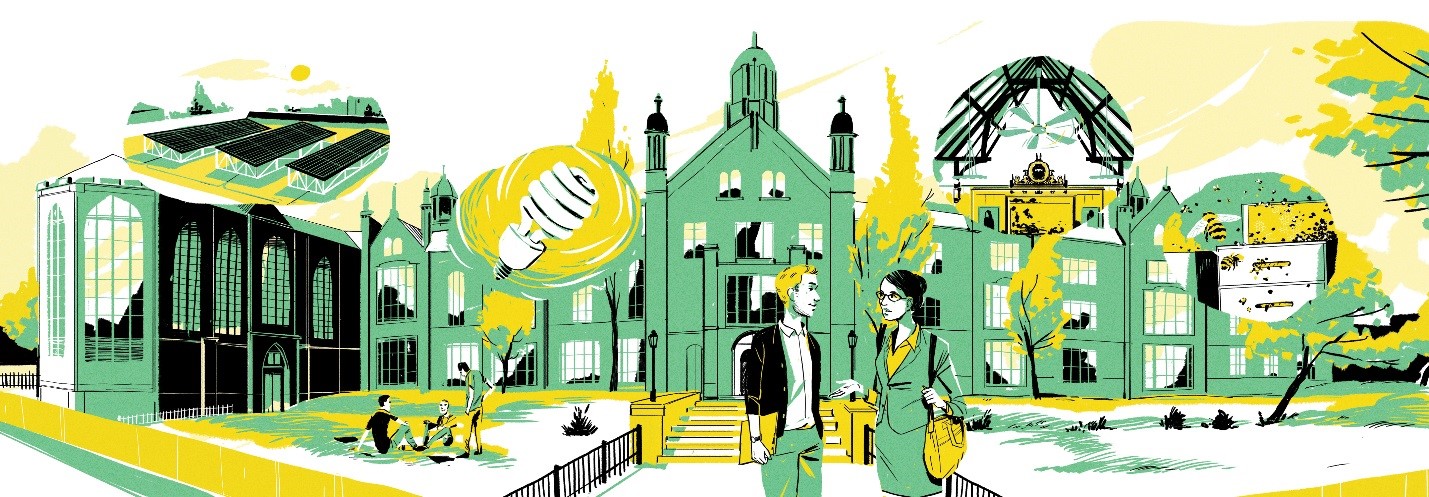

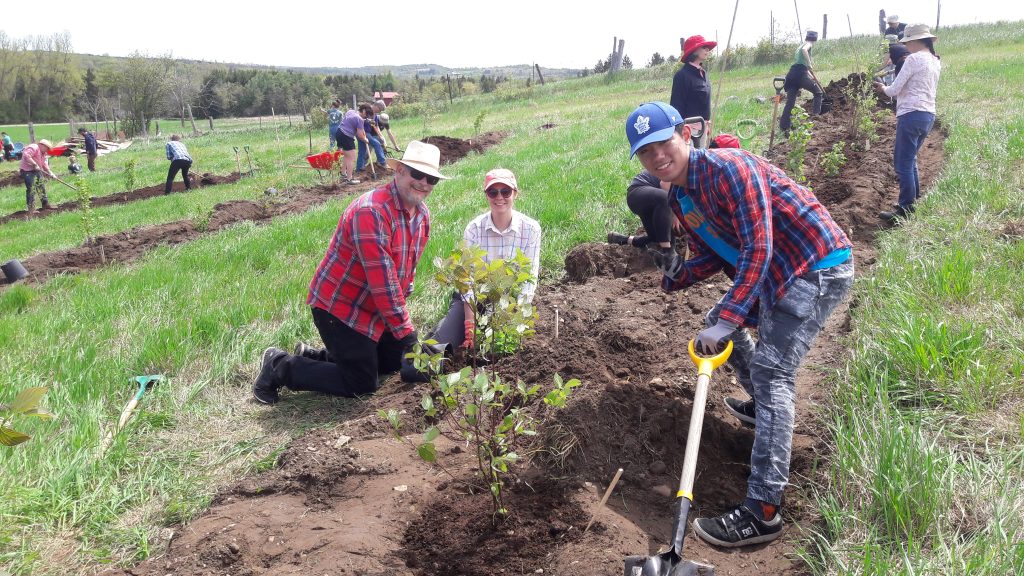 |
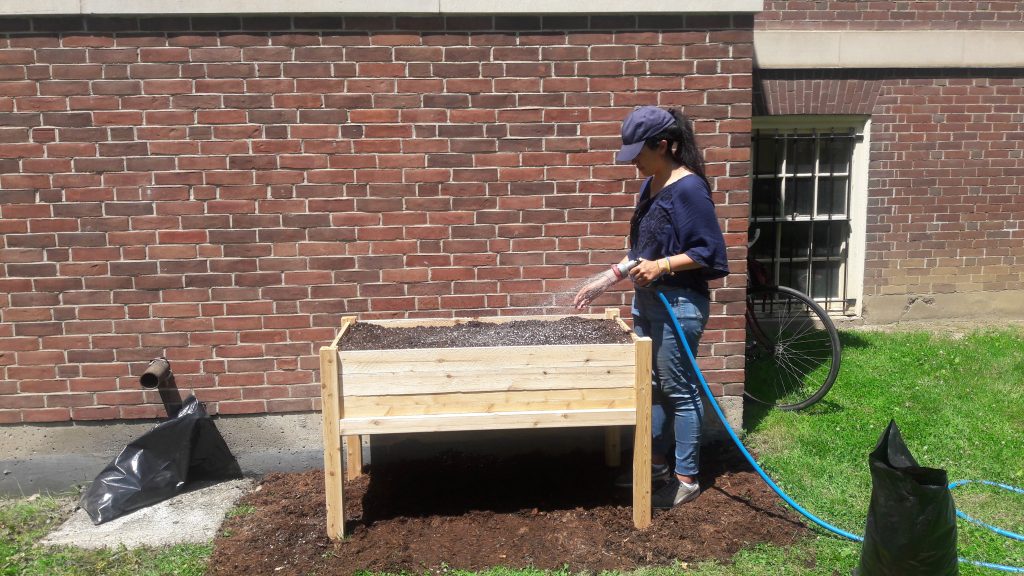 |
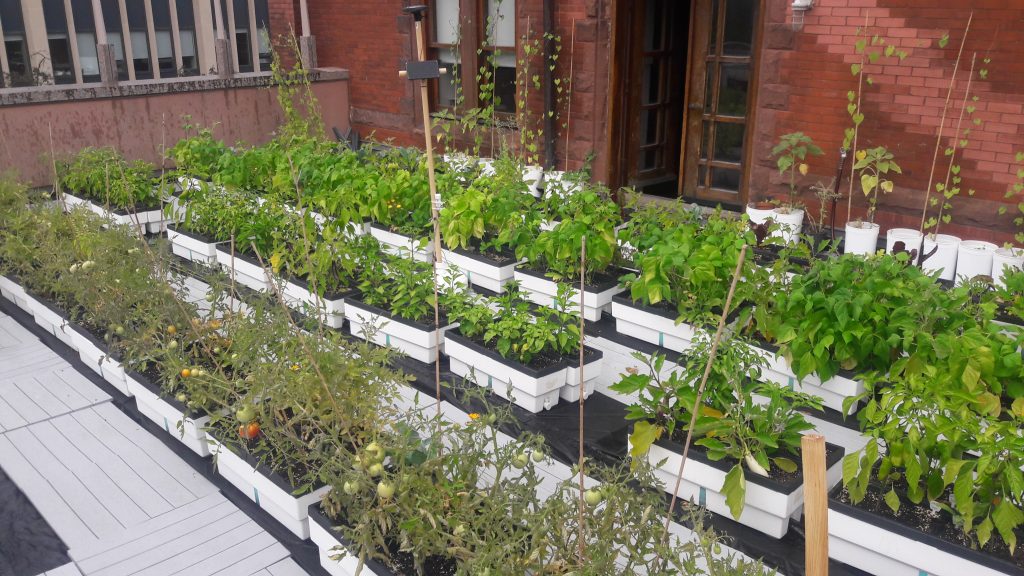 |
(Photos above – left to right: students planting seedlings in a field; student watering raised garden bed; rooftop container garden)
The Trinity Food Systems Lab (previously known as the Trinity Sustainable Food Systems Research Group or SFSRG) is comprised of passionate students, staff and faculty focused on research, action, and learning to realize ecologically sound and socially just food systems.
Click here to learn more about the Food Ssystems Lab, research projects and the people involved.
Trinity College is pleased to announce the inaugural leadership of its Integrated Sustainability Initiative. Stephen Scharper will serve as Director of Sustainability and Nicole Spiegelaar will serve as the Assistant Director. In these roles, they will develop and support the ambitious Initiative that is designed to integrate the principles of sustainability into the daily life at the College – from academic programs and co-curricular programming to the student experience.
In October 2019, thanks to a very generous $10 million gift by Trinity alumnus Brian Lawson and U of T alumna Joannah Lawson, the College launched the Integrated Sustainability Initiative. In addition to integrating sustainability into all facets of the College, the Initiative will transform the built environment through the College’s new building, the Lawson Centre for Sustainability, scheduled to open in 2024. The Lawsons’ vision and support for sustainability will enable Trinity College to build upon its longstanding commitment to environmental leadership by creating a new model in which students both ‘live and learn’ sustainability.
“The Integrated Sustainability Initiative will have a profound impact on the student experience at Trinity College and will equip students with the tools to address one of the globe’s most pressing challenges,” said Professor Mayo Moran, Provost and Vice-Chancellor of Trinity College. “We are thrilled to have Stephen Scharper and Nicole Spiegelaar take on these important new roles at Trinity. Their multi-disciplinary approach and focus on the student experience will enable us to weave sustainability principles into all facets of life at the College, creating a dynamic ‘living lab’ at Trinity.”
Click here to read the full announcement.

Angela Gong & Maddie Frechette are part of Trinity’s Sustainable Food Systems Research Group.
Better nutrition in the city. Cleaner food for the future. This summer’s crop of young researchers in Trinity’s Sustainable Food Systems Research Group (SFSRG) are not only contributing to a better food supply system for Toronto, but sowing the seeds of impactful careers to come.
Prof. Michael Kessler, Director and Raymond Pryke Chair in the Margaret MacMillan Trinity One Program, launched the research group in summer 2019 thanks to a generous donor. Following their first year, students from the Trinity One program enrich their studies via supervised individual research projects, work-study placements in campus gardens, and summer internships with partner organizations.
“The gift allowed us to prioritize promising younger students,” says Kessler. “It’s hard for undergraduates to gain access to meaningful research opportunities before their fourth year. Our goal was to connect them with these opportunities right away, and let them demonstrate that they can contribute even after first year.”
While the pandemic nixed student-led garden work this year for the budding program, Kessler and colleague Prof. Jayeeta Sharma found two projects that could be done remotely as part of Sharma’s U of T-funded COVID-19 research effort, Feeding the City: Pandemic and Beyond.
Angela Gong, who is entering her third year at Trinity, comes from a family who plants a 2,000-square foot garden through Fresh City Farms. She saw COVID-19’s impact first hand as markets couldn’t open until late June. Gong’s summer survey of other small growers assessed Toronto’s capacity for community gardens: How much could Toronto expand allotments? How to maximize their productivity?
“The multidisciplinary research that I have undertaken with SFSRG—working with both people and plants—has definitely shaped how I will approach science in my future career,” she says.
Meanwhile, soon-to-be-second-year student Maddie Frechette evaluated the sustainability of Toronto’s farm operations, and whether public policy nurtures or withers such systems. She found that short-term pandemic support programs were frustratingly bureaucratic, but farmers’ organizations hunger for long-term thinking, including policies that reward sustainable growing.
“This research has furthered my interest in the intersection of law and environmentalism,” she says. “I plan to work towards creating a more resilient food future in Canada.”
Both projects have created valuable research related to the current pandemic, and will also support Trinity’s ambitious plans for the new Lawson Centre for Sustainability building, and a revitalized campus rooted in sustainable practices.
“Angela’s work will help inform our planned urban agriculture operation,” says Kessler. “We’re learning which plants thrive in the city, and what’s the best bang for your buck in terms of nutrients. Meanwhile, Maddie’s research is growing our knowledge base around food policy. These student reports will go into a local repository at Trinity and future students will be able to take up related research questions this fall.
“What’s really rewarding,” he adds, “is seeing students grow and develop their research skills. I’m so excited that this is going to continue for the next several years and that this project has become an integral part of making the College into a hub of undergraduate research related to sustainability.”
Published in Trinity magazine July 31, 2020
Trinity received $10 million from Brian ’82 and Joannah Lawson to support an ambitious initiative designed to integrate sustainability across the College.
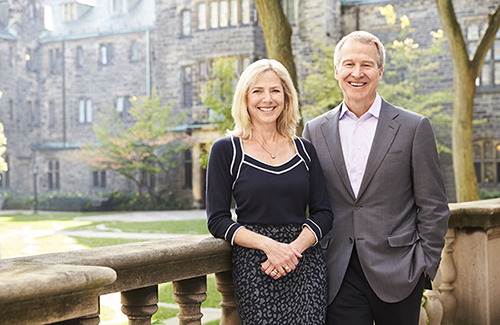
Brian and Joannah Lawson’s visionary support for sustainability will shape a sustainable, healthier future for the entire Trinity community
TORONTO, Canada – October 17, 2019
Trinity College has received $10 million to support an ambitious initiative designed to integrate sustainability across the College, from an innovative new building to research and classroom opportunities to the creation of food. The donation comes from Trinity alumnus Brian Lawson ’82 and Joannah Lawson (Master of Industrial Relations ’89, U of T). The Lawsons’ generous gift is the largest single donation in Trinity College’s 168-year history.
Joannah, a nutrition consultant who focuses on prevention of chronic disease through nutritional change at organization and community levels, and Brian, Managing Partner and Chief Financial Officer of Brookfield Asset Management, are committed to supporting food systems that promote physical and mental health and are environmentally sustainable.
“There is growing science showing a strong connection between nutrition and physical as well as mental health,” said Joannah Lawson. “Nutrient-empty foods also take a heavy toll on the planet. Supporting Trinity students, who go on to be thought-leaders and decision-makers in their chosen fields, with a healthy living environment and an understanding of sustainability practices will have a positive impact on this and future generations.”
When Trinity College, with its long history of being a sustainability leader on campus, realized it had to add new space to its historic campus, it saw a once-in-a-generation opportunity. Over the past decade, faculty, students, staff and alumni have come together to support innovative sustainability projects including a rooftop garden at St. Hilda’s, urban beehives on Henderson Tower, geothermal heating in the new Archives, solar panels, and a rainwater reclamation system. However, the new building made it possible to take this commitment to sustainability to a whole new level.
“The College wanted to create a space that was sustainable, human-scaled and intelligent, that embodied our values and supported the flourishing of the humans within it and the world around it. This inspired us to further examine all that we do through the lens of sustainability, asking ourselves what more we can do to respond to this generation’s greatest challenge,” said Trinity College Provost Mayo Moran. “By integrating principles of sustainability into daily life at Trinity—from the urban farming initiative to classroom and research opportunities to the broader student experience—the College aims to make a positive difference and show what is possible.”
The new space is the centrepiece of the Integrated Sustainability Initiative. The first significant space added to the College in many decades, it aims to be a leader in sustainable, human-scaled design. Trinity’s new initiative will do more than just promote sustainability in the built environment—it will connect it directly to the student experience through innovations such as the unique “Farm to Table” program. A creative urban farming initiative, this program will offer students the chance to participate directly in the creation of their food as well as to conduct research on those practices right at the College. A community kitchen will serve as a hub for teaching and learning about sustainable food practices and will provide an important community gathering space. But Trinity’s sustainability ambitions go beyond the building. As part of the Initiative, fluency in sustainability will be integrated into academic programs and students will be able to take advantage of new learning opportunities focused on sustainability both inside the classroom and through research and internships. A new Director of Sustainability will support these activities and will oversee the development of academic and co-curricular sustainability programming including internships and community outreach.
Trinity College is not alone in its commitment to sustainability. It is also a key priority for the University of Toronto as a whole and Trinity is working with the Faculty of Arts and Science and its School of the Environment to develop various elements of the Initiative. “Introducing ways in which students can have personal impact and feel connected to important issues such as climate change and the environment is critically important,” said Melanie Woodin, Dean of the Faculty of Arts and Science. “We are delighted to partner with Trinity College on this exciting initiative and are grateful for the generous support of the Lawsons.”
Sustainability became part of the College’s curriculum in 2018, with the launch of the Butterfield Environment & Sustainability Stream in the Margaret MacMillan Trinity One Program. The new Trinity One stream examines the most challenging issues surrounding human beings, the planet and our future together. It is the only program at U of T that allows first-year students to look at sustainability issues from both arts and sciences perspectives.
“We have witnessed first-hand how committed the leadership team and the students at Trinity are to sustainability,” said Brian Lawson. “We knew that Trinity would be innovative in moving forward, and when the opportunity arose we strongly wanted to support this vital initiative.”
“Universities have a crucial role to play in helping meet the global challenge of sustainability,” said University of Toronto President Meric Gertler. “Joannah and Brian have been prominent champions of our efforts at U of T, through their generous philanthropy and their wise counsel. This visionary gift builds on their remarkable legacy.”
Said Provost Moran, “As the Trinity community develops plans for a new building on campus, we are so fortunate to have visionary alumni like Brian and Joannah Lawson, who share our values and make it possible for us to transform the lives of Trinity students by realizing our desire to make a difference.”
Published in Trinity magazine October 17, 2019
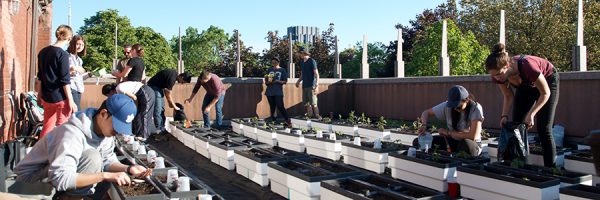
Trinity’s Urban Agriculture Project continues. This summer, the garden has bloomed into 80 containers on the rooftop of one of the College’s buildings!
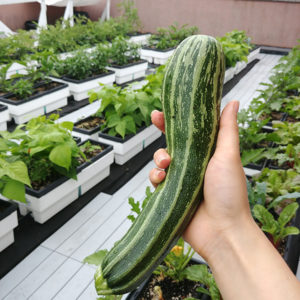 It started as a 20-container garden on the rooftop of one of Trinity College’s building – Munk North, growing vegetables, greens and pollinator friendly flowers. This summer, the garden has bloomed into 80 containers thanks to the help of donors, and the project incorporates some pilot sustainability adaptations to the space, including rainwater catchers and organic fertilizers.
It started as a 20-container garden on the rooftop of one of Trinity College’s building – Munk North, growing vegetables, greens and pollinator friendly flowers. This summer, the garden has bloomed into 80 containers thanks to the help of donors, and the project incorporates some pilot sustainability adaptations to the space, including rainwater catchers and organic fertilizers.
Now the garden host tomatoes, leafy greens, herbs, flowers, beans, squash, and zucchinis, all cared for by a team of Trinity students, alumni and summer research interns from the Butterfield Environment & Sustainability stream of the Margaret MacMillan Trinity One Program, who are running a variety of studies and projects. There are even some edible oddities (Google Cucuamelons!).
Further, another term of Professor John Robinson’s ENV461 has passed, and an additional project was designed by a group of students: a rainwater harvesting system. Their final report (pdf) was used as a basis for a successful funding proposal to the Student Capital Campaign Committee (the body funds long-term projects that generate permanent gains for the college community).
Learn more about how Trinity is Cultivating Passion, read Trinity Magazine and discover how like-minded alumni, students, staff and faculty are propagating sustainability at the College.
In September 2018, we welcomed the first cohort of students to the new Butterfield Environment & Sustainability stream of the Margaret MacMillan Trinity One Program. “Globally relevant institutions such as Trinity College and the University of Toronto have a vital role to play in educating future leaders about the importance of sustainability and the environment. With this new stream Trinity, in partnership with the University of Toronto’s School of the Environment, is stepping into that leadership role. It will also be the only program at the University that allows first-year students to look at environmental issues from both arts and sciences perspectives,” said Prof. Mayo Moran, Provost and Vice-Chancellor of Trinity College.
The Butterfield Environment & Sustainability stream will use an interdisciplinary approach that combines both the sciences and the arts. Students will learn how to think about the complexities of environmental sustainability from both theoretical and practical perspectives. Learn more about the Environment & Sustainability stream.
The new stream has had broader effects across academic programming: with it came co-curricular programming on issues of sustainability for all Trinity One students, and extra-curricular opportunities such as sustainability-focused internships for both first- and upper-year students.
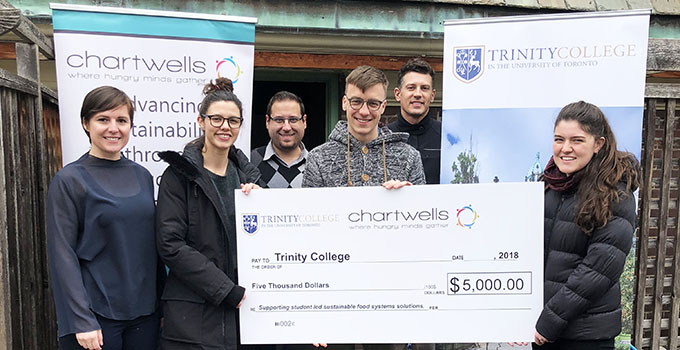
Trinity students and Assistant Provost Dr. Jonathan Steels receive Chartwells Campus Project prize
An exciting new project is slated to begin this summer at Trinity. Building on the College’s leadership in sustainable practices, an urban agriculture container garden will be created on the rooftop of one of buildings on the Trinity campus: North House of the Munk School of Global Affairs.
Trinity has long pursued a path of environmental action, implementing projects like the Gerald Larkin Building solar panels, urban beehives on Henderson Tower, geothermal heating in the new Archives and a storm water reclamation system, as well as consistently reducing energy consumption. Trinity’s Margaret MacMillan Trinity One Program will also enroll its first cohort of students in the Butterfield Environment & Sustainability Stream this fall, providing students with the opportunity to gain early exposure to environmental studies.
In keeping with this legacy, the new pilot project will not only reduce Trinity’s carbon footprint through the local production of food, but will also provide members of the Trinity community meaningful engagement with nature.
Using auto-irrigated pots, plants like tomatoes, zucchini, eggplant, herbs and squash, as well as flowers to attract pollinators, will be grown as part of the pilot. Planters will be placed on a thin protective layer, directly upon the flat, walled, southern exposure rooftop.
The idea for a rooftop urban agriculture project was developed in Prof. John Robinson’s 4th year course ENV461: U of T as a Living Lab of Sustainability. Prof. Robinson is U of T’s Presidential Advisor on the Environment, Climate Change, and Sustainability and an Associate of the College. As part of the course, Trinity students Emily Shaw, Nathan Postma and Emily Neeson, together with their peers, submitted a proposal for this green roof to Assistant Provost Dr. Jonathan Steels. With the support of Dr. Steels, the students also applied for and won a $5,000 Chartwells Campus Project award to support sustainable practices in food service through an urban agriculture pilot. Since 2014, Chartwells has supported university and college students to develop innovative concepts to address environmental and social changes.
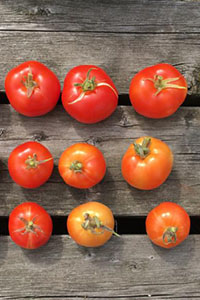 With this seed funding and the extensive research conducted by our students, the urban agriculture pilot was able to move forward. This pilot builds on the success of an initiative by Trinity student Mbonella Phiri-Nkomo, who grew several pots of tomatoes and peppers on the St. Hilda’s roof last summer.
With this seed funding and the extensive research conducted by our students, the urban agriculture pilot was able to move forward. This pilot builds on the success of an initiative by Trinity student Mbonella Phiri-Nkomo, who grew several pots of tomatoes and peppers on the St. Hilda’s roof last summer.
Recognizing the many environmental benefits that green roofs offer, the City of Toronto created a bylaw mandating green roofs be part of all new building developments. While many green roofs consist of grasses, the number of urban agriculture projects, similar to the one planned at Trinity, has been steadily increasing across the GTA in recent years. Trinity’s new pilot will also serve to test the feasibility of urban agriculture for future expansion to existing and potential new roof spaces at the College.
Thanks to the efforts of our students, alumni, staff, faculty and the Provost’s Environmental Protection Committee, Trinity continues to move towards a more sustainable tomorrow.
Thanks to a dedicated group of students, Trinity’s Urban Agriculture Pilot Project is thriving! The tomatoes are ripening, the cucumber and zucchini plants blossoming, and there has already been a first harvest of lettuce. Here’s a look at our growing garden!
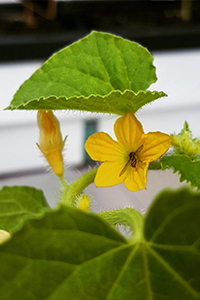 |
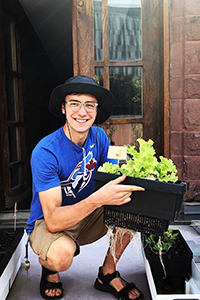 |
Trinity College alumni George ’61 and Martha ’63 Butterfield have generously donated $1.25 million to the College to establish the new Butterfield Environment & Sustainability Stream in the Margaret MacMillan Trinity One Program.
“Globally relevant institutions such as Trinity College and the University of Toronto have a vital role to play in educating future leaders about the importance of sustainability and the environment. With this new stream Trinity, in partnership with the University of Toronto’s School of the Environment, is stepping into that leadership role. It will also be the only program at the University that allows first-year students to look at environmental issues from both arts and sciences perspectives,” said Prof. Mayo Moran, Provost and Vice-Chancellor of Trinity College. “Trinity is so very fortunate to have the commitment and generosity of alumni like George and Martha Butterfield to make this partnership a reality.”
The new Butterfield Environment & Sustainability Stream will examine the most challenging issues surrounding the environment and sustainability. Students will learn how to think about the complexities of environmental sustainability from both theoretical and scientific perspectives. Students will study the ethical issues arising from the way humans interact with nature, the human impacts on physical and biological systems, and identify pathways to sustainability. An exciting complement to the current interdisciplinary Trinity One Program, the inaugural cohort of first-year students will be enrolled in the stream in September 2018.
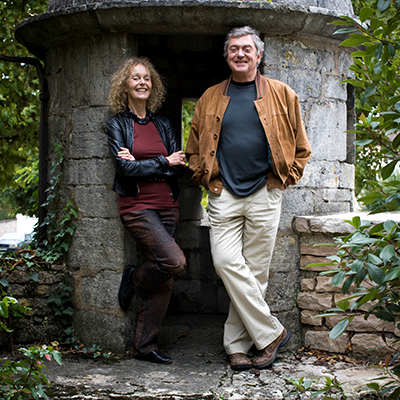
Martha and George Butterfield
George and Martha Butterfield, founders of Butterfield & Robinson, a world leader in luxury active travel, have a deep commitment to the environment, spanning more than 50 years. Both have been integral in a number of sustainable projects in Toronto and at Trinity College.
“It was important to George and me that our gift help to educate students on the issues and challenges of environmental stewardship and give them the tools to see the issues from a variety of perspectives,” Martha Butterfield said. “Environmental issues are complex by nature. We saw the Trinity One Program as the perfect fit for a multi-faceted approach to the issues.”
The Margaret MacMillan Trinity One Program was established in 2005 to offer discussion-based seminar courses to first-year students in the Faculty of Arts & Science at the University of Toronto. The program provides students the opportunity to explore major issues and ideas pertaining to human life and world affairs, while in a small-group environment conducive to deep discussion, interaction and mentorship with faculty through classroom learning and co-curricular programs. The small community also allows students to get to know their peers and study with Trinity’s exceptional faculty.
“The Trinity One Program has, from the very beginning, adopted an interdisciplinary approach to the most pressing social issues facing human beings. Environmental problems have increasingly become a common thread in our various streams. Creating a new stream dedicated to the study of the environment is a natural progression and it will absolutely strengthen the existing complement,” said Prof. Michael Kessler, Director and Raymond Pryke Chair in the Margaret MacMillan Trinity One Program. “As with all of our offerings in Trinity One, the new stream will focus on collaborative learning through guided discussion. We look at the best arguments for all points of view and try to leave no stone unturned. By using this method, students acquire advanced skills in their first year, and this allows them to hit the ground running as they move into their majors and specialist programs.”
The Butterfield Environment & Sustainability Stream will further enrich the Trinity One Program, which includes the following streams: International Relations; Ethics, Society & Law; Policy, Philosophy & Economics; Anne Steacy Biomedical Health; and Anne Steacy Medicine & Global Health.
This is also the first time a stream has been developed in collaboration with a University partner. Prof. Michael Ratcliffe, Trinity’s Dean of Arts and Vice-Provost, said the collaboration with the School of the Environment adds value to both institutions. “When one looks at the outcomes for interdepartmental collaboration, the benefits are clear. This partnership will give our Trinity One students access to even more resources at the University while building academic relationships and networks that will benefit them for years to come,” Prof. Ratcliffe said. “It also exposes students to the field of Environmental Sciences, which is a unique opportunity for first-year students at U of T, and offers a path to continue their studies.”
Equally important to George and Martha Butterfield is that their gift is invested in a way that reflects their lifelong commitment to the environment, and that students understand that the courses are funded by sustainable investments. To that end, Trinity College has partnered with Greenchip Financial, a firm that invests only in companies that provide products and services that improve the efficiency of natural resource use and address environmental challenges.
“Supporting Trinity in their mandate to foster leadership and responsibility is mutually beneficial,” George Butterfield said. “Martha and I are committed to supporting innovative change through education, and we couldn’t think of a better place than the school that is so meaningful to us. We believe that this stream has the potential to give students the foundation they need to effect real change as future leaders.”
Applications for the 2018-2019 Margaret MacMillan Trinity One Program are now open. Trinity One is open to all full-time students entering their first year of study in the Faculty of Arts & Science at the St. George campus, regardless of college affiliation. For more information, visit www.trinity.utoronto.ca/trinityone.
(Photo by Chris Wahl)

Since 2015, Trinity College has been transforming the food offerings to its students in its main student dining hall – Strachan Hall. While the changes are extensive, the key principals of change are to support student health while catering to values of more environmentally sustainable and ethically procured food.
“At Trinity, we value supporting the whole person by providing authentic, healthy and ethically procured food to nourish the body, mind and conscience,” Trinity College Provost Mayo Moran said. “Excellent food is a critical element in cultivating and supporting student health and wellness, and ultimately overall student success, and this is reflected in our values of the College’s Health & Wellness initiative.”
Trinity College Board of Trustee member Joannah Lawson, a registered nutritionist, has been playing a central leadership role in helping the College transform its food services and menus. “We are providing delicious, nutritious and healthy food options – foods that are lower in sugar, sodium, unhealthy fats and preservatives, while high in nutrients and fibre, including whole grains, which are important for good health, energy and prevention of chronic disease,” she said.
What students will find at Strachan Hall is vastly different than the usual fare found in most university dining halls.
At Trinity, food is cooked from scratch using whole foods. In fact, on average, an additional 245 cases of fresh produce per month are being consumed by Trinity students since this work started – that is a huge increase in fresh fruits and vegetables consumption!
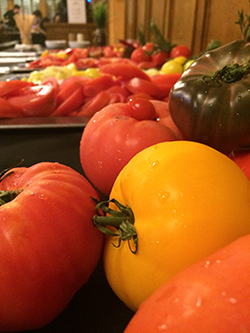 All the sauces, soups and salad dressings are made-from-scratch with no food additives, providing a more delicious and nutrition food experience for students. Recently made-from-scratch breakfast loaves and muffins – with wholesome ingredients including vegan and gluten-free options – have been added to the menu.
All the sauces, soups and salad dressings are made-from-scratch with no food additives, providing a more delicious and nutrition food experience for students. Recently made-from-scratch breakfast loaves and muffins – with wholesome ingredients including vegan and gluten-free options – have been added to the menu.
Students can also select from a wide variety of meals and snacks, including freshly made omelets, healthy sandwich bar (deli meat has been replaced with in-house roasted and hormone-free meats), smoothie bar, more healthy proteins such as fish, fresh and varied salad bar with homemade dressings, cheeses, creative vegetarian and gluten-free options, and freshly made soups that are low in sodium. Along with improving the quality and variety of fruits and vegetables, the College uses always fresh, never frozen ingredients, and prepares all produce in-house. And fresh whole or cut fruits are always available at all meals.
Trinity’s Associate Director, Community Wellness has put a creative spin on the ever-expanding salad bar offerings in Strachan Hall. She created “Ramata’s Salad of the Day” recipes so students can learn new food preparation ideas while also being inspired to try a wider variety of nutritious foods.
Many jurisdictions around the world are introducing “soda taxes,” which increases the price of sugar-sweetened beverages as a method to tackle the rising rate of diabetes and other diet-related diseases. To reduce sugar consumption in beverages, Trinity has taken a positive approach by making the best beverage – water – a whole lot more exciting. Since the installation of the infused water stations (flavoured naturally with citrus, melon, cucumber, mint, berries and rosemary) the rate of water consumption has sky rocketed with a parallel plummet in the consumption of sugary sodas by 50%.
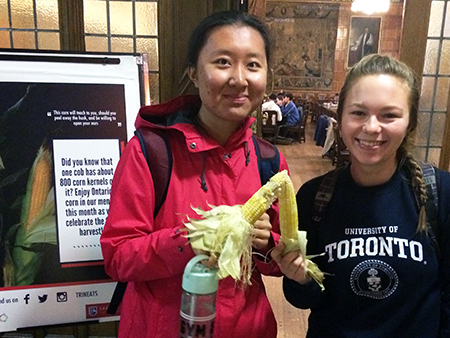 Working with the College’s administration and Food Services team, the Student Food Advisory Committee (SFAC) provides ongoing student (residence and commuter) feedback about food quality, sourcing and variety. Through the SFAC and feedback from the College’s annual food survey, students have made it clear that the environment matters and they prefer to have food that has a lower carbon footprint in how it is produced and how far it travels to land on their plates. In addition, in May 2016, Trinity received a Fair Trade Campus designation, which recognizes universities and colleges that have shown a strong commitment to Fair Trade principles and to offering Fair Trade products.
Working with the College’s administration and Food Services team, the Student Food Advisory Committee (SFAC) provides ongoing student (residence and commuter) feedback about food quality, sourcing and variety. Through the SFAC and feedback from the College’s annual food survey, students have made it clear that the environment matters and they prefer to have food that has a lower carbon footprint in how it is produced and how far it travels to land on their plates. In addition, in May 2016, Trinity received a Fair Trade Campus designation, which recognizes universities and colleges that have shown a strong commitment to Fair Trade principles and to offering Fair Trade products.
“In a world where the negative human impacts on our climate and environment are real, being part of the solution towards sustainable local and regional food sourcing that reduce costs, carbon and energy foot prints is a no-brainer,” Trinity student Mbonella said.
Trinity has increased its locally sourced foods to 25% and that number will keep growing. A seasonal menu has been developed to feature local foods in season and to celebrate them with the students in creative and delicious ways. For example, the September tomato tasting event was very popular, only to be outdone by the October corn roast.
Along with nourishing the body, Strachan Hall also plays an important role is bringing the community together to enhance the student experience for resident and commuter students. “I find the community hub of Trinity is Strachan…the kitchen is the heart of the home, then Strachan is the heart of Trin, for res and non-res students alike,” said Trinity College commuter student AnneMichaela. “The inclusivity of non-residence students in the dining spaces leads them to feel more comfortable with all aspects of the college…and to be invested in the college as a whole.”
Highlights from the College’s most recent student food survey and other updates will be shared in the new year. For more delicious photos, follow Trinity College Food Services on Instagram @TrinEats!
Local Cheese Tasting: Thursday, January 26 from 11:30 am to 12:30 pm in Strachan Hall. Students will have the opportunity to do a blind cheese tasting of some locally sources cheeses.
Beet Brownie Valentines: Tuesday, February 14 from 11:30 am to 1:30 pm in Strachan Hall. Drop by to get your prepackaged beet brownies with valentines – give to a partner/friend or enjoy the treat yourself!
Both events are free and open to all Trinity students.
View the latest Sustainability news!